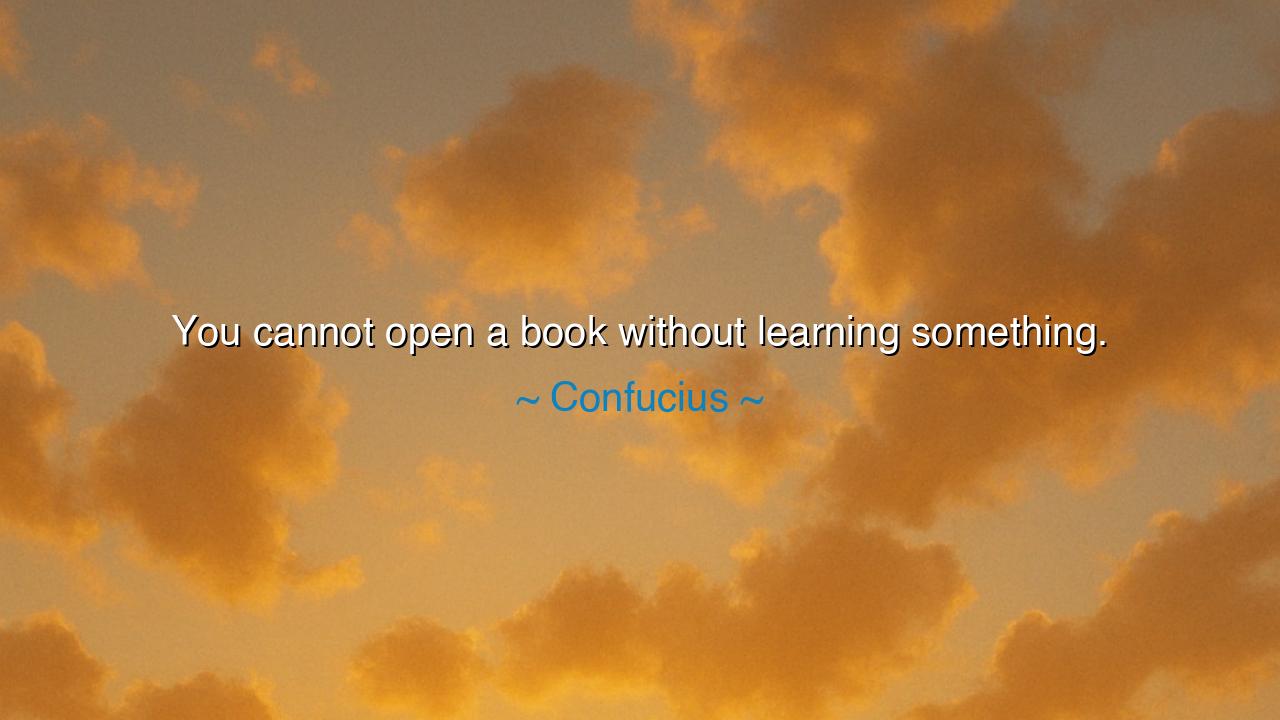
You cannot open a book without learning something.






“You cannot open a book without learning something.” — Thus spoke Confucius, the great sage of the East, whose wisdom has guided the hearts of men for over two millennia. In this simple yet profound saying lies the spirit of eternal learning — the belief that every encounter with knowledge, however small, enriches the soul. For to open a book is to open a doorway to another world, another mind, another time. And within that act — humble though it may seem — the seeds of understanding are sown, the light of wisdom kindled, and the eternal dialogue between teacher and student renewed.
Confucius lived in an age of turbulence and transformation, yet he believed steadfastly in the power of learning to bring order to chaos and virtue to the human heart. To him, education was not a privilege but a sacred duty, the means by which one cultivated harmony within oneself and society. When he said, “You cannot open a book without learning something,” he did not speak of mere memorization or academic pursuit. He spoke of the living exchange between mind and spirit — the subtle way in which reading shapes thought, strengthens morality, and awakens empathy. For the book is more than ink upon paper; it is the preserved essence of human experience, distilled through time and offered as nourishment to the seeking soul.
To learn from a book is not only to gather knowledge, but to be transformed by it. Every page, every sentence carries with it the life of another — their struggles, their insights, their dreams. Even the smallest passage can stir reflection or kindle inspiration. Confucius saw learning as a river that never ceases to flow, one that replenishes itself with each generation. When a person opens a book, they step into that river, and though they may drink but a cupful, they leave changed. The act itself — of opening, reading, receiving — is an act of reverence toward truth.
Consider the story of Abraham Lincoln, the humble boy from the American frontier. His world was one of poverty, yet his hunger for learning was boundless. With few books at hand, he read the same volumes over and over — the Bible, Aesop’s Fables, Shakespeare. Each word became a lantern in his darkness, illuminating the path that would one day lead him to greatness. Though his hands were calloused from labor, his mind grew vast from reflection. It was said that he carried a book everywhere, reading by firelight, pausing to ponder, to question, to learn. Lincoln’s life stands as living proof of Confucius’s truth — that to open a book is to open the mind, and through that opening, one may rise beyond all limitation.
But there is a deeper wisdom hidden in the Master’s words: that learning is not confined to scholars or to the halls of education. Every person, whether young or old, rich or poor, carries the capacity to learn. A single proverb, a story from history, a poem or letter — all contain lessons waiting to be revealed. The wise see no book as too small, no lesson as too simple. Even a tale meant for children may unveil truths profound enough to guide a lifetime. For the book mirrors the reader — what one discovers within it depends on the openness of the heart and the depth of the mind that reads.
The teaching of Confucius, then, is not merely about books, but about the spirit of inquiry. To open a book is to say, “I am ready to grow.” It is to step beyond the walls of one’s certainty and into the boundless field of wisdom. Yet the Master also cautioned that learning without reflection is empty. One must not read blindly, but with presence, with discernment, with the intention to apply what is learned. Knowledge, he taught, becomes virtue only when it shapes conduct. To read deeply, therefore, is to live wisely.
So, my child, hear the voice of the ancient teacher: Do not let a single day pass without learning something new. Open books not for vanity, but for growth. Read not to escape the world, but to understand it. Choose your books as you would choose your friends — with care, with respect, with purpose. When you read, do not rush. Let the words settle in your soul like rain upon dry earth. Question what you read, reflect upon it, speak of it, live it.
For in the end, as Confucius reminds us, every book is a vessel of wisdom, and every time you open one, you are in conversation with the ages. Whether the lesson is grand or small, the act of learning enriches the heart and refines the mind. The book, once opened, can never leave you as it found you — and that is the true miracle of knowledge: it makes you more than you were, and it asks only that you turn the page.






AAdministratorAdministrator
Welcome, honored guests. Please leave a comment, we will respond soon